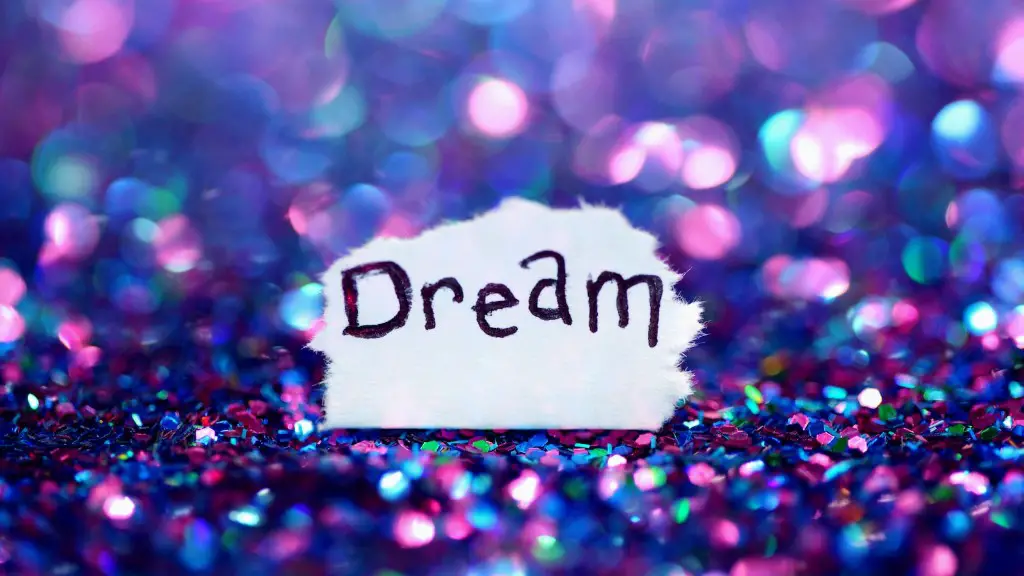There are a few different things you can do to increase the chances of having a vivid dream. One is to keep a dream journal by your bed and write down any dreams you remember as soon as you wake up, even if they seem mundane. Studies have shown that people who regularly write down their dreams have more recalled dreams with more vividly remembered details. Another way to have more vivid dreams is to try to lucid dream, or become aware that you are dreaming while you are still dreaming. This can be done through a technique called “reality checking,” where you perform certain actions during the day that you would not be able to do in real life, like flying or walking through walls. When you do these reality checks during the day, it will carry over into your dreams and you will become aware that you are dreaming. Lucid dreaming can take some practice, but it is a fun way to have more control over your dreams and make them more vivid.
There’s no one answer to this question as everyone experiences dreams differently. However, there are some things you can do to try and have more vivid dreams. First, try to get a good night’s sleep and avoid watching television or using electronic devices before bed as they can interfere with your sleep cycle. Once you’re in bed, try to relax your whole body and clear your mind by focusing on your breath. Once you feel relaxed, start thinking about what you want to dream about. It’s important to be specific and really visualize what you want to dream about happening. Try to hold onto that image as you fall asleep. If you wake up during the night, don’t move around too much as this can disrupt the dream state. Lie still and see if you can continue the dream from where you left off.
What causes more vivid dreams?
There are a few different theories as to what causes vivid dreams, but the most likely cause is simply that during REM sleep, our brains are more active and we are more likely to remember our dreams. So if you have a particularly vivid dream, it’s likely because you were in a deep REM sleep when you had that dream.
It is said that certain foods can give you nightmares. Cheese, pasta, meat, pizza, spicy foods, pickles, milk, sugar, sweets, and candy are all said to be culprits. If you have a bad dream after eating any of these foods, it may be best to avoid them before bed!
Is it good if you have vivid dreams
If you are having vivid dreams frequently and it is interfering with your day-to-day life, it can cause harmful effects on your overall health and well-being.
REM sleep is important for a person’s overall health and well-being. Getting a good night’s sleep and experiencing REM dreams can actually improve a person’s ability to do certain things when they are awake.
What drinks give you vivid dreams?
There is some evidence to suggest that drinking milk before bed could be beneficial since milk contains melatonin – a hormone that helps regulate your sleep patterns. Not only will it help your sleep, but the melatonin in milk could help you have good dreams. You’ll be sleeping longer (hopefully in REM sleep) and have good dreams, too.
There is evidence to suggest that dreaming enhances creativity and problem-solving ability. It is thought that deep non-REM sleep strengthens individual memories, while REM sleep is when those memories can be fused and blended together in abstract and highly novel ways. This may explain why people often come up with creative solutions to problems after a good night’s sleep.
What do vivid dreams feel like?
Vivid dreams are a type of dream that is especially intense and realistic. They can have a strong emotional impact and sometimes feel like real memories. Although they occur during the normal REM cycle of sleep, they are different from most dreams in their intensity. For some people, vivid dreams can be a source of distress and can impact mental health.
We all know that getting a good night’s sleep is important for our physical and mental health. But what happens to our brain when we don’t get enough sleep?
According to neurologist Mark Mahowald of the University of Minnesota, sleep deprivation can lead to increased brain activity during sleep, resulting in more vivid dreaming. So if you’re struggling to get a good night’s sleep, don’t despair – your dreams may just be getting more interesting!
What is the most common dream people have
Falling is the most common recurring dream people have, according to a survey of 2,007 Americans conducted by mattress and sleep product company, Amerisleep. In the survey, conducted in 2022, participants were asked to recall their most recent dream, and 37% reported that their dream involved falling.
Falling dreams can be interpreted in a number of ways, and may be associated with feelings of anxiety or insecurity. They may also represent a fear of failure or a lack of control in one’s life. If you’re experiencing frequent falling dreams, it may be worth considering whether there are any areas of your life where you’re feeling particularly vulnerable or stressed.
It’s interesting to learn that babies don’t start having vivid dreams until around the age of two. This is because their brains are still developing and it takes time for them to be able to process and remember information. It’s also important to note that even when they do start having dreams, they may not remember them. This is because the part of the brain that is responsible for forming memories is not fully developed yet.
Do people dream in color?
Kahn, Dement, Fisher, and Barmack (1962) found that 827% of the dreams their subjects reported contained colors. In a study by Herman, Roffwarg, and Tauber (1968), 69% of the subjects reported dreaming in color after being awakened from REM sleep. These studies suggest that colors are a common feature in dreams.
The majority of research seems to suggest that dream recall decreases from the beginning of adulthood onwards, with dream reports becoming less intense both perceptually and emotionally. This decrease appears to happen faster in men than women, and there seem to be gender differences in the content of dreams as well.
Is there a drug that makes you dream
It is interesting to note that various supplements and medications can promote vivid dreaming. In a 2018 study, galantamine was shown to increase lucid dreaming by 27% at 4 mg and 42% at 8 mg. Ilex guayusa can also promote vivid dreams and aids in dream recollection. Additionally, mirtazapine, paroxetine, and varenicline often cause vivid dreams.
REM sleep is when you have the most vivid dreams. Dreams can happen at any time during sleep, but you are more likely to remember them if they happen during REM sleep. Some experts say we dream four to six times a night.
Do dreams increase memory?
There is evidence that dreaming about learning experiences is associated with enhanced memory performance. It is thought that memory reactivation during sleep leads to consolidation and enhancement of postsleep memory. This suggests that dreams may play a role in memory consolidation and improve learning.
The length of a dream can vary depending on which stage of sleep it occurs. REM sleep is when people are most likely to dream, and these dreams can last for a few seconds to 20-30 minutes. If people are awakened during the REM phase, they are more likely to remember their dream.
Warp Up
There is no one-size-fits-all answer to this question, as different people have different techniques that work for them. However, some common methods for inducing vivid dreams include sleeping in a comfortable position, setting an intention before bedtime, and keeping a dream journal. Practicing lucid dreaming can also be helpful in having more vivid dreams.
The best way to have vivid dreams is to sleep well and to have a regular sleep schedule. Dreams are most vivid during REM sleep, so it is important to get enough REM sleep. Some people find that sleeping on their back allows for more vivid dreams. There are also certain supplements that can increase the vividness of dreams, such as ginkgo biloba and choline.





